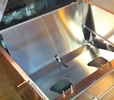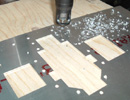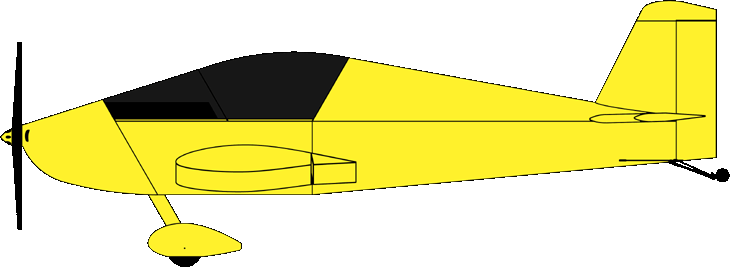


random user submitted photo
The little Old Engine That Could
11 posts
• Page 1 of 2 • 1, 2
The little Old Engine That Could
Not to 'stoke the fire' but I would like to add a few thoughts. I'm a retired Mechanical/Aerospace Engineer that spent 11 hears in college and worked for P&W and Honeywell as a Design Engineer for Rocket and Jet Engines. I also worked Stress Analysis and Heat Transfer and helped develop computational techniques for both.
People always say things like "it wasn't designed for this horsepower" or "it was designed in the 40's". While those appear to be true statements, lets think about the design. Ferdinand Porsche spent a little time in a technical school but had no formal Engineering training. He had a good aptitude for mechanical things. (Wikipedia). He kind of gets credit but who even designed the thing?
He probably didn't do any stress analysis on the engine parts. He probably didn't do any combustion, thermal, airflow, fuel dispersion, or any other technical analysis. He put together a simple mechanical device to power small cars that worked well. The engine then went thru many changes over the years which can easily be researched. How much horsepower was it designed for? Well it wasn't. He built it and tried it. He probably used some basic constraints like size and packaging and built it to see if it worked. I doubt he was looking for any particular horsepower other than some crude estimates. The intent in those days was to just make stuff work reliably.
Now jump ahead. Most of the parts in our AeroVee are from the modern racing industry. Parts that are meant for racing engines with HUGE HP claims...Now people have desktop tools to do all the analysis Porsche couldn't. Lets go interview people that have been around these engines for the last 50 years and see what design analysis they have used. Well, they probably didn't. John Monnett would be a great person to start with. He, and many others would modify parts to improve performance and life based on good practices and actual experience. Most of these parts have been optimized based on real world experience thru their years of use, testing, and failures.
How often do we hear of these VW conversion failing because we demanded too much from them? I don't think ever! Manufacturing defects caused crank to fail... Plugged oil gallery caused...Broken valve adjuster due to manufacturing tolerances...Vapor lock due to lack of fuel line cooling...Fire due to loose fittings...These could all happen to Lycoming, Continental, P&W or whatever. The very nature of Experimental engines causes these problems. Not the engine design from the 40's or because it was designed for less horsepower. The heads we use today are more than capable of cooling an 80 HP engine with proper airflow. Heck, they are capable of cooling a 160 HP engine! Just ask John. Or better yet, look at his speed records and the heads he used. All the parts for that matter.
Great Aviation Pioneers like John M, Steve B, and Scott C have proven these little engines are up to the task. Pay a little attention to the assembly process, use parts from reputable sources, etc, and they will provide years of good, reliable service at the horsepower we want. I think the most important thing you can do is listen to what they say! And maybe listen less to the Internet experts. I can't think of any reason to listen to anyone but those three guys but that's just my opinion. Sure they can quit. My wife's brand new car quit the other day. It happens. My AeroVee only has a few hundred hours on it but it has been running reliably for 15 years now with only regular oil changes and the occasional valve clearance check. I know I can always count on it to go "Putt Putt" on the second blade and deliver excellent performance right up to the point it has too much air in the fuel tank.
Lets keep talking about our little engines but maybe steer away from blaming things on a design from the 40's that was made for half the HP. Its really not the case anymore. Although that's about the only part we still use from then :)
Edit: I don't know those Revmaster guys but they have been around for a while and make a reputable product. I have never heard/read anything negative about them. For some reason, I just hear of the others more and they seem to have more visibility. And I have dealt with the others over the last 15 years...
People always say things like "it wasn't designed for this horsepower" or "it was designed in the 40's". While those appear to be true statements, lets think about the design. Ferdinand Porsche spent a little time in a technical school but had no formal Engineering training. He had a good aptitude for mechanical things. (Wikipedia). He kind of gets credit but who even designed the thing?
He probably didn't do any stress analysis on the engine parts. He probably didn't do any combustion, thermal, airflow, fuel dispersion, or any other technical analysis. He put together a simple mechanical device to power small cars that worked well. The engine then went thru many changes over the years which can easily be researched. How much horsepower was it designed for? Well it wasn't. He built it and tried it. He probably used some basic constraints like size and packaging and built it to see if it worked. I doubt he was looking for any particular horsepower other than some crude estimates. The intent in those days was to just make stuff work reliably.
Now jump ahead. Most of the parts in our AeroVee are from the modern racing industry. Parts that are meant for racing engines with HUGE HP claims...Now people have desktop tools to do all the analysis Porsche couldn't. Lets go interview people that have been around these engines for the last 50 years and see what design analysis they have used. Well, they probably didn't. John Monnett would be a great person to start with. He, and many others would modify parts to improve performance and life based on good practices and actual experience. Most of these parts have been optimized based on real world experience thru their years of use, testing, and failures.
How often do we hear of these VW conversion failing because we demanded too much from them? I don't think ever! Manufacturing defects caused crank to fail... Plugged oil gallery caused...Broken valve adjuster due to manufacturing tolerances...Vapor lock due to lack of fuel line cooling...Fire due to loose fittings...These could all happen to Lycoming, Continental, P&W or whatever. The very nature of Experimental engines causes these problems. Not the engine design from the 40's or because it was designed for less horsepower. The heads we use today are more than capable of cooling an 80 HP engine with proper airflow. Heck, they are capable of cooling a 160 HP engine! Just ask John. Or better yet, look at his speed records and the heads he used. All the parts for that matter.
Great Aviation Pioneers like John M, Steve B, and Scott C have proven these little engines are up to the task. Pay a little attention to the assembly process, use parts from reputable sources, etc, and they will provide years of good, reliable service at the horsepower we want. I think the most important thing you can do is listen to what they say! And maybe listen less to the Internet experts. I can't think of any reason to listen to anyone but those three guys but that's just my opinion. Sure they can quit. My wife's brand new car quit the other day. It happens. My AeroVee only has a few hundred hours on it but it has been running reliably for 15 years now with only regular oil changes and the occasional valve clearance check. I know I can always count on it to go "Putt Putt" on the second blade and deliver excellent performance right up to the point it has too much air in the fuel tank.
Lets keep talking about our little engines but maybe steer away from blaming things on a design from the 40's that was made for half the HP. Its really not the case anymore. Although that's about the only part we still use from then :)
Edit: I don't know those Revmaster guys but they have been around for a while and make a reputable product. I have never heard/read anything negative about them. For some reason, I just hear of the others more and they seem to have more visibility. And I have dealt with the others over the last 15 years...
- Scott Todd
- Posts: 374
- Joined: Mon Jun 24, 2019 7:40 pm
- Location: Chandler, AZ
Re: The little Old Engine That Could
Adolf Hitler's specification to Mr. Porsche was a one (1) liter engine with a 100 kilometer per hour top speed. Ferdinand couldn't pull it off without going to a 1100cc displacement. Initial HP ratings were in the 25ish range stabilizing @ 36hp till 1961 when they went up to 40 with 1200cc.
It wasn't till the very early 70s that the "modern" VW aircooled engine arrived with 1600cc engines and dual-ported heads. Those engines put out 60hp.To compare the output and cooling requirements of a VW conversion to the 40hp engine is ridiculous. They are simply not the same engine.
The heads...AHHHH the heads. At least two ways to go. (1) Think modified stock replacement automotive head. Nothing special here except bigger valves and an extra spark plug hole. Every competing manufacturer of those heads is thinking the same thing...value (read that as profits). Sound familiar? Lowest bidder? Isn't that what gave us Three Mile Island and Chernobyl? The good news is, even a low quality head will give you advanced warning of it's upcoming retirement. Gives you plenty of time to plan the party. (2) Purpose designed and built performance head. These do not to seem like much of a value if all you're thinking about is initial cost. They are not cheap. (Years ago I saw an ad for Bell motorcycle helmets. It read: Got a $10 head? Buy a $10 helmet) Heat being the enemy, clean-sheet performance based heads have larger (and in some cases, more) cooling fins. The heads I chose for my engine have 9 fins vs. the more common 8. I'm sure there are cooler running units out there, but you have to draw the line somewhere.
For those of you that have drawn that line in the name of $$$, quit your bitchin' and lap those valves again.
Still full of myself and untested here @Area 51%
It wasn't till the very early 70s that the "modern" VW aircooled engine arrived with 1600cc engines and dual-ported heads. Those engines put out 60hp.To compare the output and cooling requirements of a VW conversion to the 40hp engine is ridiculous. They are simply not the same engine.
The heads...AHHHH the heads. At least two ways to go. (1) Think modified stock replacement automotive head. Nothing special here except bigger valves and an extra spark plug hole. Every competing manufacturer of those heads is thinking the same thing...value (read that as profits). Sound familiar? Lowest bidder? Isn't that what gave us Three Mile Island and Chernobyl? The good news is, even a low quality head will give you advanced warning of it's upcoming retirement. Gives you plenty of time to plan the party. (2) Purpose designed and built performance head. These do not to seem like much of a value if all you're thinking about is initial cost. They are not cheap. (Years ago I saw an ad for Bell motorcycle helmets. It read: Got a $10 head? Buy a $10 helmet) Heat being the enemy, clean-sheet performance based heads have larger (and in some cases, more) cooling fins. The heads I chose for my engine have 9 fins vs. the more common 8. I'm sure there are cooler running units out there, but you have to draw the line somewhere.
For those of you that have drawn that line in the name of $$$, quit your bitchin' and lap those valves again.
Still full of myself and untested here @Area 51%
- Area 51%
- Posts: 804
- Joined: Thu Feb 18, 2016 7:57 am
Re: The little Old Engine That Could
"To compare the output and cooling requirements of a VW conversion to the 40hp engine is ridiculous" Which is my point exactly but people keep doing it.
For those that care, it should be noted the fins were appropriate for an (40HP class) engine that could sit in traffic or drive around city roads and not get much airflow. We blast 100 mph air across them! Again, you just can't compare them. OK, maybe not 100 MPH across them but that's our source. The pressure rise in the plenum and the subsequent airflow around the fins and heads is a whole 'nother discussion for a 'nother day :)
A first year Thermodynamic student looks at basic problems of heat transfer involving fins. Many variables come into play such as fin surface area, conduction area, airflow direction, and velocity. The number of fins can play a part but as you add fins, you loose heat conduction area at the base of the fin, for the same heat path area. Not saying one is better, just all the variables interact. Of course the best thing we can do is get more air across the fins. This means reducing pressure losses and providing best opportunity for air to move across them efficiently. This is often seen when pilots talk about climb speeds affecting cooling. Just a few miles an hour can have drastic changes when we operate on small margins.
Fun stuff but I suspect most readers are more interested in solutions than technical mumbo jumbo...If it does interest you, bust out the calculator and start Googling. You may discover why Engineering students spend so much time in school ;)
Oh, and if you really want to have fun, stick a bunch of thermocouples along a fin radially outward form the heat source and see what those temperatures really do.
For those that care, it should be noted the fins were appropriate for an (40HP class) engine that could sit in traffic or drive around city roads and not get much airflow. We blast 100 mph air across them! Again, you just can't compare them. OK, maybe not 100 MPH across them but that's our source. The pressure rise in the plenum and the subsequent airflow around the fins and heads is a whole 'nother discussion for a 'nother day :)
A first year Thermodynamic student looks at basic problems of heat transfer involving fins. Many variables come into play such as fin surface area, conduction area, airflow direction, and velocity. The number of fins can play a part but as you add fins, you loose heat conduction area at the base of the fin, for the same heat path area. Not saying one is better, just all the variables interact. Of course the best thing we can do is get more air across the fins. This means reducing pressure losses and providing best opportunity for air to move across them efficiently. This is often seen when pilots talk about climb speeds affecting cooling. Just a few miles an hour can have drastic changes when we operate on small margins.
Fun stuff but I suspect most readers are more interested in solutions than technical mumbo jumbo...If it does interest you, bust out the calculator and start Googling. You may discover why Engineering students spend so much time in school ;)
Oh, and if you really want to have fun, stick a bunch of thermocouples along a fin radially outward form the heat source and see what those temperatures really do.
- Scott Todd
- Posts: 374
- Joined: Mon Jun 24, 2019 7:40 pm
- Location: Chandler, AZ
Re: The little Old Engine That Could
Hi Scott,
Thanks for starting a new thread so this discussion can continue.
If an aircraft engine becomes non-airworthy that is an engine failure. Not a catastrophic failure, but a failure none the less. Obviously, all engines eventually fail. At the root of this discussions is the seemingly high premature failure rate of VW based aircraft engines (as compared to certified engines) due to valve/head problems.
From your first post I gather you think the we are not asking too much from the engine and that the main sources of failure are from either assembly errors or from acquiring parts from non reputable sources.
I'm just looking for answers. I'm not trying to 'stoke the fire' either. I simply want to treat my engine right and have a good time flying once I'm in the air.
I don't know. Could be that we always hear the bad news and never hear about the success stories (like yours). Could be we are using bogus criteria to judge airworthiness. I suppose I could be labeled a whiner, or told to go fly a certified aircraft, but in my dreams I would like a standardized criteria to judge when to take the engine out of service.
Do you perform compression checks at annual? What fuel do you use? Do you torque your heads? You said all you do is change the oil and check valve clearance.
Any information about how you maintain and fly your engine to achieve such positive results would be helpful.
Thanks,
Wes
Thanks for starting a new thread so this discussion can continue.
Scott Todd wrote:How often do we hear of these VW conversion failing because we demanded too much from them? I don't think ever!
If an aircraft engine becomes non-airworthy that is an engine failure. Not a catastrophic failure, but a failure none the less. Obviously, all engines eventually fail. At the root of this discussions is the seemingly high premature failure rate of VW based aircraft engines (as compared to certified engines) due to valve/head problems.
From your first post I gather you think the we are not asking too much from the engine and that the main sources of failure are from either assembly errors or from acquiring parts from non reputable sources.
I'm just looking for answers. I'm not trying to 'stoke the fire' either. I simply want to treat my engine right and have a good time flying once I'm in the air.
I don't know. Could be that we always hear the bad news and never hear about the success stories (like yours). Could be we are using bogus criteria to judge airworthiness. I suppose I could be labeled a whiner, or told to go fly a certified aircraft, but in my dreams I would like a standardized criteria to judge when to take the engine out of service.
Do you perform compression checks at annual? What fuel do you use? Do you torque your heads? You said all you do is change the oil and check valve clearance.
Any information about how you maintain and fly your engine to achieve such positive results would be helpful.
Thanks,
Wes
Wes Ragle
Onex #89
Conventional Gear
Long Tips
Hummel 2400 w/Zenith Carb
Prince P Tip 54x50
First Flight 06/23/2020
42.8 Hrs. as of 10/30/21
Onex #89
Conventional Gear
Long Tips
Hummel 2400 w/Zenith Carb
Prince P Tip 54x50
First Flight 06/23/2020
42.8 Hrs. as of 10/30/21
- WesRagle
- Posts: 899
- Joined: Fri Jan 05, 2018 12:35 pm
- Location: Weatherford, Tx
Re: The little Old Engine That Could
I think you are right that we only hear about issues. There are literally hundreds of them flying trouble free. I had a few teething pains in the beginning but attributed them to the experimental nature. For example, I had an ignition issue. I fixed it about the time a Service Advisory came from AeroVee. No biggie and I was pleased they addressed it. That was 15 years ago. How many hundreds have they sold since ;)
My compression check is literally turning the prop by hand (smartly) and feeling each cylinder. Its pretty easy to tell if one is low. Its part of my pre-flight. Every few years I put an automotive type gage on it and crank the engine a few turns to see what it pumps up. I know the leak down is an old method but I have been flying models for 50 years and can't tell you how many old motors with NO compression when turning the prop slowly but started and ran fine. We also hear it all the time about airplane engines with 40/70 or worse that run fine and seem to make power fine. I think the slow leak down is misleading. A running engine pumping that cylinder up thousands of times a minute makes compression different than a leak down test. I know hundreds of A&P mechanics will argue but we can get into the actual physics of it offline. If Continental or Lycoming says do it one way, do it. I was asked and am telling you what I do on my Experimental engine. The bottom line is if it pumps up 8:1 long enough for ignition to occur, who cares what a leak down says. I also get it could be signs of wear, imminent failure, bla, bla, bla.
I re-torqued the heads more regularly during the first few years. I don't check them as much anymore. I check valves every year or so (it doesn't get flown much) and they don't really change anymore either. I do recognize heads/valve trains seem to show problems more often and will keep an eye on them in the future. I only use 100LL.
I just bought a nearly finished Onex from a close friend. I can't wait to get it flying and expect I will have lots of fun with it and its AeroVee. I have flown 6 different Sonex Airplanes and one had a Jabiru. The Onex will be my 3rd owned AeroVee.
Scott
My compression check is literally turning the prop by hand (smartly) and feeling each cylinder. Its pretty easy to tell if one is low. Its part of my pre-flight. Every few years I put an automotive type gage on it and crank the engine a few turns to see what it pumps up. I know the leak down is an old method but I have been flying models for 50 years and can't tell you how many old motors with NO compression when turning the prop slowly but started and ran fine. We also hear it all the time about airplane engines with 40/70 or worse that run fine and seem to make power fine. I think the slow leak down is misleading. A running engine pumping that cylinder up thousands of times a minute makes compression different than a leak down test. I know hundreds of A&P mechanics will argue but we can get into the actual physics of it offline. If Continental or Lycoming says do it one way, do it. I was asked and am telling you what I do on my Experimental engine. The bottom line is if it pumps up 8:1 long enough for ignition to occur, who cares what a leak down says. I also get it could be signs of wear, imminent failure, bla, bla, bla.
I re-torqued the heads more regularly during the first few years. I don't check them as much anymore. I check valves every year or so (it doesn't get flown much) and they don't really change anymore either. I do recognize heads/valve trains seem to show problems more often and will keep an eye on them in the future. I only use 100LL.
I just bought a nearly finished Onex from a close friend. I can't wait to get it flying and expect I will have lots of fun with it and its AeroVee. I have flown 6 different Sonex Airplanes and one had a Jabiru. The Onex will be my 3rd owned AeroVee.
Scott
- Scott Todd
- Posts: 374
- Joined: Mon Jun 24, 2019 7:40 pm
- Location: Chandler, AZ
Re: The little Old Engine That Could
WesRagle wrote: I suppose I could be labeled a whiner, or told to go fly a certified aircraft, but in my dreams I would like a standardized criteria to judge when to take the engine out of service.
Wes,
I don't think you are a whiner - but you are not going to get a definitive answer either. And you won't in the certificated world either - especially in Part 91 ops where TBO is advisory and many engines are run way past TBO "on condition". Even the certificated world doesn't necessarily hold much store by leakdown tests - if the valves are tight. Continental and Lycoming both have procedures for validating a cylinder that might test as low as 30 but be perfectly airworthy after 30 mins hard running. I'm with Scott on this - my "test" at each oil change and plug clean is to put my thumb over the spark plug hole and flick the prop - instant way of finding the "soft" cylinder.
A low time engine might not have been flown more than 10 hours a year - for years - and be so full of corrosion as to be junk.
Running an engine in the tie downs to "warm it up" - even if not flown - is considered by most to be a dreadful practice - but many owners think it a good thing to do.
Sticking valves is not necessarily a reason to tear down a cylinder or a head. The rope trick to drop the valve into the engine, ream the valve clear of fouling lead and cooked oil - and then draw the valve back into the guide can save disturbing cylinders or heads.
TCP keeps plugs cleaner, keeps the lead out the oil and so out the valve guides. There are some much easier to handle formulations than the old syringe dosing method.
EGT's at 50 F degrees rich of peak is taught in many schools - but more modern thinking shows it can be one of the worst spots to run an engine for CHT's.
Lean of peak is derided by many - but again - modern thinking and data shows that it is a viable way to get economy and not bust an engine (though achieving it on small flat 4's is not so easy). It got Lindberg across the Atlantic and frequently across the Pacific during WWII.
Oil analysis is cheap insurance. Any one analysis is not going to tell you anything- but over time it will give you a great TREND as to what is going on in your engine.
A real problem I come across is a lot of Old Wives' Tales about "best" practice, oils, plugs and settings - certified or not. All dearly held by the mechanic touting it. And why not - it is probably the basis of their experience. But when I see them selling the $12/quart oil as being "best" when the $8 a quart oil also exceeds the engine manufacturer's requirements - I do wonder.
In an era when we now have decent and affordable engine monitoring of CHT, EGT and Fuel flow against RPM - it is possible to collect vast data sets and start to draw conclusions from them. Mike Busch now has one of the largest data sets for GA aircraft out there. He has shown that many OWT's are just that - "tales".
So I expect you are going to find lots of opinions in forums that are well held on the basis of an individual's experience. At the end of the day - you are still going to have to evaluate and come to your own conclusion.
Frankly it is why I am taken with much of what Mike Busch has to say.
YMMV
Graeme JW Smith
-

GraemeSmith - Posts: 939
- Joined: Sat May 18, 2019 8:58 am
- Location: RI
Re: The little Old Engine That Could
All good stuff Graeme!
The rope trick sounds interesting. I may have to investigate that.
But fortunately for us, if required, a head tear down is pretty easy and can be done in less time than a Paid mechanic charges for cleaning plugs :)
Again, good stuff Graeme.
The rope trick sounds interesting. I may have to investigate that.
But fortunately for us, if required, a head tear down is pretty easy and can be done in less time than a Paid mechanic charges for cleaning plugs :)
Again, good stuff Graeme.
- Scott Todd
- Posts: 374
- Joined: Mon Jun 24, 2019 7:40 pm
- Location: Chandler, AZ
Re: The little Old Engine That Could
Rope Trick (albeit on a big ol' Warner radial):
https://www.youtube.com/watch?v=4PM8PFwYJmw
What he doesn't demonstrate is tying dental floss (or very fine safety wire) around the groove in the valve stem for the valve keepers, dropping the valve into the cylinder, reaming the valve guide and then fishing the valve back into place with the floss - but you get the idea.
I've also used the rope just to compress and "pop" a stuck valve back into place on an engine that had "morning sickness". Not a permanent cure - but might "get you home". A suitable bit of rope is in the tool roll in the plane - doesn't weigh much.
https://www.youtube.com/watch?v=4PM8PFwYJmw
What he doesn't demonstrate is tying dental floss (or very fine safety wire) around the groove in the valve stem for the valve keepers, dropping the valve into the cylinder, reaming the valve guide and then fishing the valve back into place with the floss - but you get the idea.
I've also used the rope just to compress and "pop" a stuck valve back into place on an engine that had "morning sickness". Not a permanent cure - but might "get you home". A suitable bit of rope is in the tool roll in the plane - doesn't weigh much.
Graeme JW Smith
-

GraemeSmith - Posts: 939
- Joined: Sat May 18, 2019 8:58 am
- Location: RI
Re: The little Old Engine That Could
Scott Todd wrote:All good stuff Graeme!
The rope trick sounds interesting. I may have to investigate that.
But fortunately for us, if required, a head tear down is pretty easy and can be done in less time than a Paid mechanic charges for cleaning plugs :)
Again, good stuff Graeme.
I had the rope trick performed on my Cont. O-200. The sticking valve, due to 100 LL use in a low compression engine. The oil analysis that I did on every oil change showed a PPM increase of all the dirt elements and took three more oil changes to go back to normal. I think he put grease on the reamer to attempt to catch the "dirt". I don't know how he fished the valve back up through the guide after reaming. Something through the other spark plug hole? On a certified engine the exercise is well worth avoiding the cylinder removal. On the Aerovee probably not.
OneX 107
N2107X
N2107X
- Onex107
- Posts: 506
- Joined: Mon Mar 24, 2014 6:44 pm
- Location: Peoria, IL
Re: The little Old Engine That Could
You can't have anything in the valve guide while reaming. Dental floss? Wire? Not. If you could tie it to the end of the reamer and push it ahead as you reamed, then pull it back through, that would work. Special reamer for the rope trick? How about a magnet? Very tricky problem.
OneX 107
N2107X
N2107X
- Onex107
- Posts: 506
- Joined: Mon Mar 24, 2014 6:44 pm
- Location: Peoria, IL
11 posts
• Page 1 of 2 • 1, 2
Who is online
Users browsing this forum: No registered users and 21 guests







